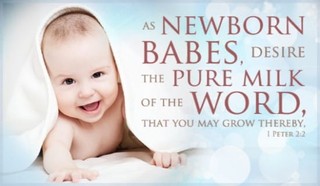
Change Translation
- Recent Translations
- All Translations
Images for Kefa I 2:1

Kefa I 2:1 Meaning and Commentary
Wherefore, laying aside all malice
Since the persons the apostle writes to were born again, and therefore ought to love one another, he exhorts them to the disuse of such vices as were disagreeable to their character as regenerate men, and contrary brotherly love; he dissuades them from them, and advises to "lay them aside", either as weights and burdens, which it was not fit for new born babes to carry; see ( Hebrews 12:1 ) or rather as old worn out clothes, as filthy rags, which should be put off, laid by, and never used more, being what were very unsuitable to their character and profession to wear: the metaphor is the same as in ( Ephesians 4:22 ) ( Colossians 3:8 Colossians 3:9 ) and the first he mentions is malice; to live in which is a mark of an unregenerate man, and very unbecoming such who are born again; and is not consistent with the relation of brethren, and character of children, or new born babes, who are without malice, and do not bear and retain it: "all" of this is to be laid aside, towards all persons whatever, and in every shape, and in every instance of it:
and all guile;
fraud, or deceit, in words or actions; and which should not be found, and appear in any form, in Israelites indeed, in brethren, in the children of God; who ought not to lie one to another, or defraud each other, nor express that with their lips which they have not in their hearts; which babes are free from, and so should babes in Christ:
and hypocrisies;
both to God and men: hypocrisy to God is, when persons profess that which they have not, as love to God, faith in Christ, zeal for religion, fervent devotion, and sincerity in the worship of God; and do all they do to be seen of men, and appear outwardly righteous, and yet are full of all manner of iniquity: hypocrisy to men is, pretence of friendship, loving in word and tongue only, speaking peaceably with the mouth, but in heart laying wait; a sin to be abhorred and detested by one that is born from above; and is contrary to that integrity, simplicity, and sincerity of heart, which become regenerate persons, the children of God, and brethren one of another:
and envies;
at each other's happiness and prosperity, riches, honours, gifts temporal or spiritual; for such are works of the flesh, show men to be carnal, are unbecoming regenerated persons, and contrary to the exercise of Christian charity, or love, which envieth not the welfare of others, either respecting body, soul, or estate:
and all evil speakings;
backbitings, whisperings, detractions, hurting one another's characters by innuendos, false charges, and evil surmises; which is not acting like men that are made new creatures, and are partakers of the divine nature, nor like brethren, or as Christ's little ones, and who are of God, begotten again to be a kind of firstfruits of his creatures.
Kefa I 2:1 In-Context
Study Tools
PLUSUnlock Notes
This feature is for PLUS subscribers only. Join PLUS today to access these tools and more.
JOIN PLUSUnlock Highlights
This feature is for PLUS subscribers only. Join PLUS today to access these tools and more.
JOIN PLUSUnlock Bookmarks
This feature is for PLUS subscribers only. Join PLUS today to access these tools and more.
JOIN PLUSTrack Your Reading
Create a free account to start a reading plan, or join PLUS to unlock our full suite of premium study tools.